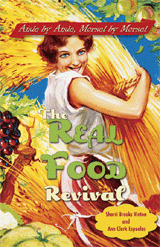 As an editor and a writer, I spend a lot of time reading the works of other published writers, working under the theory that only if you are exposed to great writing can you begin to emulate it. By noticing the tricks and tools that accomplished writers use, another writer can, without copying a particular style, learn to make their own work even more evocative, descriptive and informative. Which means I read a lot of food writing, ranging from poor and amateurish and bland, to pieces that are inspiring, professional and heartfelt. Food and the act of eating being somewhat sensual subject matter, finding a writer who can scatter words onto a page and create a passage as breathtaking as a night sky full of stars is a rare thing indeed.
As an editor and a writer, I spend a lot of time reading the works of other published writers, working under the theory that only if you are exposed to great writing can you begin to emulate it. By noticing the tricks and tools that accomplished writers use, another writer can, without copying a particular style, learn to make their own work even more evocative, descriptive and informative. Which means I read a lot of food writing, ranging from poor and amateurish and bland, to pieces that are inspiring, professional and heartfelt. Food and the act of eating being somewhat sensual subject matter, finding a writer who can scatter words onto a page and create a passage as breathtaking as a night sky full of stars is a rare thing indeed.
And finding out that the same writer no longer writes for a living can cause one to do a double-take and then doubt their own abilities even more.
Such is the case with Eating My Words: How Marilyn Monroe is Like a Grilled Artichoke and Other Observations on Food
by Eve Johnson.
 Despite being what would inevitably fit into the classic definition of a “foodie”, I don’t buy a lot of cookbooks. As is obvious from this blog, I don’t post a lot of recipes, and while I do love to cook and try new things in the kitchen, I tend not to be a big cookbook collector. Part of this is due to limited space on my kitchen shelves, and part is due to being one of those obsessive Virgo types who chuck anything they haven’t used in a year.
Despite being what would inevitably fit into the classic definition of a “foodie”, I don’t buy a lot of cookbooks. As is obvious from this blog, I don’t post a lot of recipes, and while I do love to cook and try new things in the kitchen, I tend not to be a big cookbook collector. Part of this is due to limited space on my kitchen shelves, and part is due to being one of those obsessive Virgo types who chuck anything they haven’t used in a year.



 Three years is such a short time in the grand scheme of things, but in the publishing world, it can be an eternity. Books come and books go, and a lot of great books don’t get the publicity they deserve. Which is likely why I was able to find
Three years is such a short time in the grand scheme of things, but in the publishing world, it can be an eternity. Books come and books go, and a lot of great books don’t get the publicity they deserve. Which is likely why I was able to find